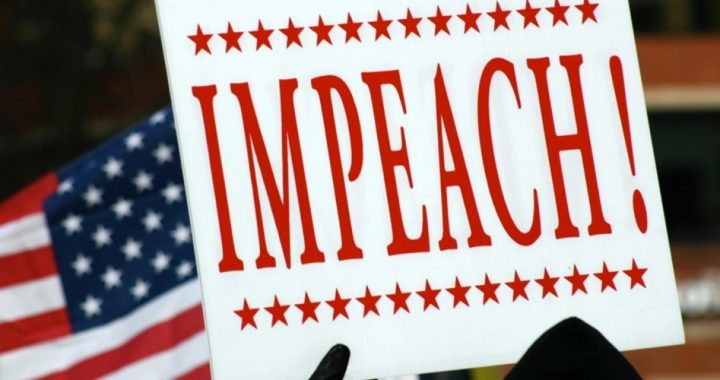
Several Democratic members of Congress have announced plans to propose a bill of impeachment against President Donald Trump, but they are finding the process more difficult than simply accusing him of crimes on CNN.
Monday morning, Politico reported that Democrats in Congress believe that impeaching the president is “both inevitable and impossible.”
Explaining this dilemma, Politico added: “Democrats anticipate they will gather plenty of evidence of high crimes and misdemeanors on the president’s part, but they’re torn over what to do with it — fearful that their efforts will backfire and end up helping Trump.”
“You don’t want to divide the country, so you have to think you have such a case that once the case is finished being presented, enough people understand you had to do it,” House Judiciary Committee Chairman Jerrold Nadler (D-N.Y.) said, as reported by Politico.
Part of the difficulty in impeaching a president is inherent in the process as set forth in the Constitution.
Article II, Section 4 mandates the method of impeachment: “The President, Vice President and all civil officers of the United States, shall be removed from office on impeachment for, and conviction of, treason, bribery, or other high crimes and misdemeanors.”
In an earlier article I presented an in-depth analysis of the history and meaning of “high crimes and misdemeanors,” so for now it is enough to summarize the standard. Basically, the relevant impeachment inquiry focuses on whether the president is suspected of abusing the trust placed in him by the people and whether that abuse injures the people or the Constitution that binds them in a union.
While Democrats pursue various avenues they believe (hope) will lead them to evidence sufficient to support impeachment, the pragmatic political considerations are giving many of the president’s detractors cause to pause in their effort to evict him from the White House.
The proposal and its potential political fallout is described in a quote included in the Politico article:
“If you impeach somebody and then it dies in the Senate, I think the president would proclaim vindication,” said Representative Raja Krishnamoorthi (D-Ill.), a member of the Intelligence and Oversight committees. “And if it had been around election time, he would definitely win despite all of the criminality that has occurred in this case.”
In other words, although Democrats are now the majority party in the House of Representatives, that party’s leadership recognizes that impeachment is only the first part of the process, and conviction of those charges by the Senate is nearly unimaginable.
And that’s how it should be. Impeachment, conviction, and removal from office should not be something that can be accomplished without extraordinary support from lawmakers on both sides of the aisle.
“You still have to prove it. You have to make a case,” Representative Gerry Connolly (D-Va.) said. “You don’t begin by declaring someone guilty and then fill in the blanks.”
Except that is precisely the modus operandi of politicians today: If you want to impeach the president for collusion with the Russian government to steal the election in 2016, then accuse him of it, distribute the talking points to your media mouthpieces, then try and find evidence. Then, if you spend millions of dollars and hundreds of hours trying to prove the charges and you come up empty, prosecute (and persecute) the president’s past associates and family.
Of course, saving one’s political hide makes sense to members of Congress, but there are any number of groups that make up the Democratic Party’s base that want the president punished and they don’t care whether representatives believe impeachment and conviction are possible.
Tom Steyer, for example, is a billionaire who can make winning a seat in Congress much easier, and he is holding meetings in key districts aimed at summoning calls from the grassroots to push a bill of impeachment through, regardless of political expediency.
For now, however, even the extreme left-wing of the Democratic Party is stiff-arming Steyer and others who will settle for nothing short of surrender. Party leadership looks at the bigger political picture and realizes that rushing to judgment is fine for cable “news” shows, but actually constitutionally convicting the president of “high crimes and misdemeanors” is difficult and divisive and not worth the political capital it would cost to even start the impeachment process.
To be fair, there are those among Republicans who would support impeachment if there were irrefutable evidence that President Trump committed impeachable offenses. In a survey conducted by the Washington Post and Schar School in February, 35 percent of Republican respondents said they would support impeachment if President Trump could be proven to have obstructed justice with regard to the investigation being conducted by special counsel Robert S. Mueller into Russian meddling in the 2016 election and the president’s participation in that scheme.
Notice how the focus has moved to obstruction of justice in the investigation of collusion with Russia rather than on the charge of having actually colluded. Again, Democratic leadership knows that there is no proof of the latter so they have to float the former as a possible avenue of attack on Donald Trump’s presidency.
If federal lawmakers cared more about being faithful to the Constitution than to securing their seats in Congress, it wouldn’t matter whether there was an R or a D after their name, their first priority would be protecting the people from tyrants. With such an outlook, articles of impeachment would be filed fearlessly by representatives of the people when the president has committed impeachable acts.
As it stands today, representatives realize that talking about impeachment satisfies the talking heads on TV and satisfies their own commitment to keeping their seats in Congress.
Image: BenThomasPhoto via iStock / Getty Images Plus



